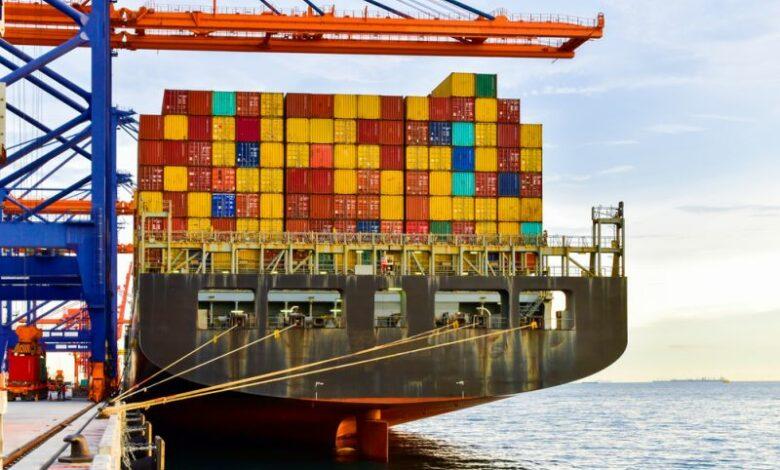
Top 15 Busiest Cargo Ports in Africa – Africa is home to some of the world’s busiest and most important cargo ports. These ports serve as crucial gateways for international trade and the movement of goods across the continent and beyond. In recent years, many African ports have experienced rapid growth in cargo traffic, driven by economic development and increased trade volumes.
This article will provide an overview of the 15 busiest cargo ports in Africa based on total cargo tonnage handled per year. For each port, we will highlight key statistics, facilities, strategic location, and major imports and exports. Understanding the capabilities and roles of Africa’s major ports provides insight into the continent’s trading relationships and economic prioritiesTop 15 Busiest Cargo Ports in Africa
👉 Relocate to Canada Today!
Live, Study and Work in Canada. No Payment is Required! Hurry Now click here to Apply >> Immigrate to CanadaThe Top 15 Busiest Cargo Ports in Africa Are:
1. Port Said, Egypt
Located along the Suez Canal in northeastern Egypt, Port Said is Africa’s busiest port by cargo tonnage. It handles over 56 million tons of cargo annually. As a crucial link between the Mediterranean Sea and Indian Ocean, it serves as a strategic transshipment hub for cargo moving between Europe and Asia. Major imports include finished goods, machinery, and grains. Exports include cotton and textiles. Its facilities include over 55 berths and extensive container handling capability. Its location makes it a vital gateway between Europe and the Suez Canal Economic Zone.
Read Also: Top 15 Natural Spring Water in Nigeria
2. Durban, South Africa
Durban is South Africa’s busiest cargo port, handling over 31 million tons annually on its modern deepwater harbor on the Indian Ocean coast. With extensive berths, ship repair facilities, and sophisticated cargo handling infrastructure, Durban plays a key role in serving South Africa’s import and export needs. Major exports include minerals, metals, and agricultural products from the country’s interior. Imports include manufactured goods and oil. Durban’s large container capacity and connections to rail and road networks make it a crucial entry point for goods into southern Africa.
3. Port of Alexandria, Egypt
The Port of Alexandria handles over 28 million tons of cargo per year on the Mediterranean coast in northern Egypt. Its strategic location near the mouth of the Nile River and proximity to the Suez Canal has made it an important harbor since antiquity. Modern facilities include bulk, container, and general cargo terminals. It maintains trading relationships across southern Europe, the Levant, and North Africa. Exports include textiles, metals, and agricultural goods. Alexandra’s role as Egypt’s main seaport is expected to grow with future expansion projects.
4. Port of Algiers, Algeria
Located on the Mediterranean Sea, the Port of Algiers handles over 26 million tons of cargo each year. As Algeria’s main commercial port, it serves as the gateway for the majority of the country’s international trade. Major facilities include dedicated terminals for containers, general cargo, grains, minerals, and oils. Top commodities exported include petroleum, iron, and wheat. Key imports include machinery, manufactured goods, and chemicals. Its proximity to Algeria’s capital city and connection to road and rail networks gives it an advantage in serving domestic and international markets.Good morning My Love Message
Read Also: Top 15 Link Building Tools in Nigeria
5. Port of Richards Bay, South Africa
Specializing in bulk cargo, the Port of Richards Bay handles over 24 million tons annually on South Africa’s eastern coast along the Indian Ocean. It features one of the world’s largest coal export terminals, handling exports from nearby mines. Additional facilities include terminals for aluminum, chrome ores, and agricultural products. As South Africa’s premier bulk cargo port, Richards Bay provides a high-capacity gateway to global markets for the country’s minerals and other resource exports. Planned expansions intend to grow its capacity in the coming years.NYSC Portal
6. Port of Mombasa, Kenya
Located along the Indian Ocean coast of Kenya, the Port of Mombasa handles nearly 24 million tons of cargo per year. It serves as Eastern Africa’s busiest port and a gateway for trade in the region. Key imports include oil, machinery, and manufactured goods. Exports include tea, coffee, and other agricultural commodities. Mombasa features over 20 deepwater berths, extensive container facilities, and connections to road and rail networks. Ongoing expansion aims to grow Mombasa’s capacity and cement its role as the region’s dominant port.
👉 Relocate to Canada Today!
Live, Study and Work in Canada. No Payment is Required! Hurry Now click here to Apply >> Immigrate to Canada7. Port of Tangier Med, Morocco
Tangier Med is a relatively new port facility located strategically near the Strait of Gibraltar along Morocco’s northern coast. Since opening in 2007, it has rapidly grown into one of Africa’s busiest ports, handling over 22 million tons of cargo in 2021. Its location makes it an ideal transhipment hub between African and European markets. Tangier Med includes dedicated terminals for containers, bulk goods, automobiles, and oil. Major exports include manufactured goods, textiles, and electronics while top imports are energy products, grains, and machinery.JAMB portal
8. Port of Djen-Djen, Algeria
Specialized in handling exports of Algerian iron ore and steel, Djen-Djen is Algeria’s second busiest port with over 16 million tons of annual throughput. Its mineral terminals have the specialized loading and unloading infrastructure needed for Algeria’s mining industry. Bulk carriers transport cargoes of iron ore and steel from Djen-Djen worldwide, making it a vital part of the global metals supply chain. The port is managed by Algerian state-owned companies and continues to expand its operations and capacity.
Read Also: Top 15 Career Prize Money in Sport
9. Port of Dakar, Senegal
Serving as Senegal’s main commercial port, Dakar handles approximately 12 million tons of cargo each year on West Africa’s central coast. Its facilities include dedicated container, bulk, and oil terminals. Dakar maintains trade connections across the Atlantic with Europe and the Americas. Major exports include minerals, peanuts and cashew nuts, and fish products. Imports include rice, sugar, cement, and petroleum. Ongoing modernization programs aim to expand Dakar’s capacity and efficiency to better serve Senegal and the West African region.
10. Port of Durban, Tunisia
Located along Tunisia’s eastern Mediterranean coast, the Port of Durban handles over 11 million tons of cargo annually. Serving as Tunisia’s primary commercial port, it handles most of the country’s imports and exports. Key facilities include bulk grain terminals and container handling capacity. Major exports include phosphates, olive oil, and minerals. Top imports include wheat, barley, machinery, and wood products. Its strategic location makes it a gateway for trade between Tunisia, Europe, and the Middle East.Information guide Nigeria
11. Port of Abidjan, Ivory Coast
Located along the Ivory Coast’s southern Atlantic coast, the Port of Abidjan handles around 11 million tons of cargo per year. It serves as the major regional shipping hub for West Africa. Abidjan features dedicated terminals for containers, wood products, coffee and cocoa beans, aluminum, and petroleum. Ongoing expansion plans aim to increase its capacity and cement its position as the leading port in West Africa. Key imports include machinery, vehicles, and food products, while exports include cocoa, coffee, cashews, and wood products.
12. Port of Beira, Mozambique
Mozambique’s busiest port, Beira handles around 10 million tons of cargo annually on the country’s central coast along the Indian Ocean. It serves as a major gateway for trade in the southeast African region. Key commodities exported through Beira include aluminum, chrome, steel, and agricultural products from neighboring countries like Zimbabwe. Beira recently upgraded its port infrastructure but remains an important link between coastal and landlocked economies in Southern Africa.
Read Also: Top 15 Hall of Fame Coaches in Sports History
13. Port of Tema, Ghana
Strategically located near Ghana’s capital Accra, the Port of Tema handles nearly 10 million tons of cargo each year. As Ghana’s primary commercial port, it handles the majority of the country’s exports and imports. Key facilities include container, bulk, and oil terminals. Exports include cocoa, minerals, lumber, and aluminum. Top imports include petroleum, machinery, and manufactured goods. As Ghana’s economy continues rapid growth, Tema aims to expand its capacity through additional berths, terminal upgrades, and improved road and rail links.
14. Port of Dar es Salaam, Tanzania
Serving as Tanzania’s main seaport, Dar es Salaam handles around 8 million tons of cargo annually along the country’s central Indian Ocean coast. It provides a crucial shipping gateway for Tanzania and neighboring landlocked countries like Zambia, Burundi, and Rwanda. Major exports include cotton, coffee, tea, and other agricultural commodities. Imports include oil, machinery, and consumer goods. Ongoing port improvements aim to reduce congestion and keep up with growing East African trade volumes.Romantic love message
15. Port of Luanda, Angola
Located on Angola’s northern Atlantic coast, the Port of Luanda handles approximately 7 million tons of cargo each year. It serves as Angola’s main commercial port, handling the majority of the country’s marine trade. Top exports include crude oil, diamonds, and coffee. Major imports include food products, construction materials, vehicles, and machinery. Luanda’s facilities are relatively underdeveloped but continue to modernize as Angola emerges from decades of civil conflict. Improving this strategic port remains a priority for the Angolan government and economy.
Read Also: Top 15 Alternative Healing Secrets in Nigeria
Conclusion
Africa’s major cargo ports provide essential infrastructure enabling international trade and access to the global economy. As African economies grow and trade expands, port capacity and efficiency will become increasingly vital. Ports like Port Said, Durban, and Tangier Med have made the investments to become world-class facilities handling tens of millions of tons of cargo each year. Other developing ports have room to improve. But collectively, Africa’s ports are strategic national assets that facilitate economic development across the continent. Understanding the capabilities and locations of Africa’s busiest cargo ports provides insight into the future of African and global trade.
Check JAMB RESULT
Check and Confirm: How much is Dollar to Naira




